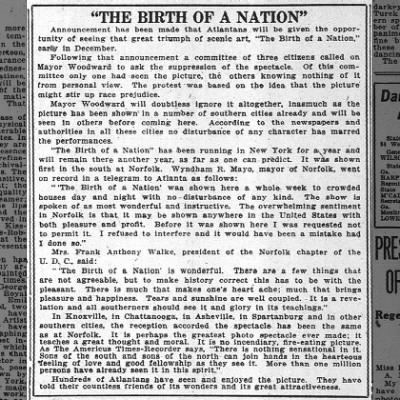D W Griffith's epic 1915 film, The Birth of a Nation, is widely considered Hollywood's first blockbuster.
The movie, which alternates between intimate family shots and grand battle scenes with thousands of actors, includes everything from love scenes to the burning of Atlanta. It introduced new film techniques, and cost the equivalent of over 2 million dollars to make.
This 1915 ad from the Poughkeepsie Journal calls it, "The greatest dramatic narrative of the century" and claims that the film has been "Seen by Over Five Million People."
Admission to the film was $2 (equivalent to about $44 today) and theaters were sold out for days. Here's a December 12, 1915 review in the Atlanta Constitution that describes the "clamors of hundreds turned away."
In this article, Griffith justifies the ticket price and predicts future movie prices as high as $5.
The plot, which is based on Thomas Dixon's novel and play The Clansman (the film was originally released under that title), follows two families, one from the North and the other from the South, before, during and after the Civil War and depicts the Ku Klux Klan rising from the chaos of reconstruction to establish order in the post-war South.
By modern standards, parts of the film are melodramatic and overdone to the point of silliness, but Griffith used all the tools available to him to create a spectacle that moved audiences in 1915 and is still powerful today.
Even in its own day, critics blasted the historical inaccuracies and racist nature of the film. The inflammatory narrative lead to violence against African-Americans and rioting in some locations and several major cities canceled performances of the film.
This 1915 review in the Poughkeepsie Journal focused on the spectacle of the show and concludes with, "The play is, as has often been said, rather partisan, and the reconstruction part very much overdrawn and exaggerated, but it furnishes a thrilling drama with the picturesque Ku Klux to the rescue."
In looking through other contemporary newspaper coverage of the film, it was interesting to see the way people responded to the movie. In some cases, it's hard to know what was hype and promotion and what were sincere expressions, but I was struck by statements like this one from a pre-performance article in the Poughkeepsie Journal extolling the "historical worth of this great spectacle."
This two page ad in the Atlanta Constitution includes many endorsements, including one quoting "Prof. Richard A. Dobbie, Superintendent Norfolk City Schools" as saying, "The Birth of a Nation reproduces historical events with marvelous fidelity."
This ad/article, published before the movie came to Atlanta, mentions that three citizens requested the mayor ban the film and then quotes several people in support of it, including "Mrs. Frank Anthony Walke, president of the Norfolk chapter of the U. D. C." who said: "The Birth of a Nation is wonderful. There are a few things that are not agreeable, but to make history correct this has to be with the pleasant. ... It is a revelation and all southerners should see it and glory in its teachings."
I don't think many people today would consider using Griffith's film to teach history, but the Wikipedia article about it claims that, "As late as the 1970s, the Ku Klux Klan continued to use the film as a recruitment tool."
The Birth of a Nation is now in the public domain. In fact, you can watch it online in its entirety at the Internet Archive, here.




No comments:
Post a Comment